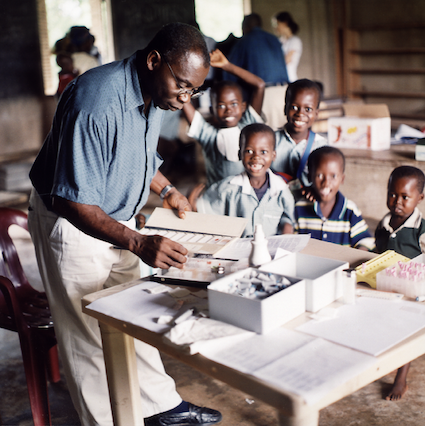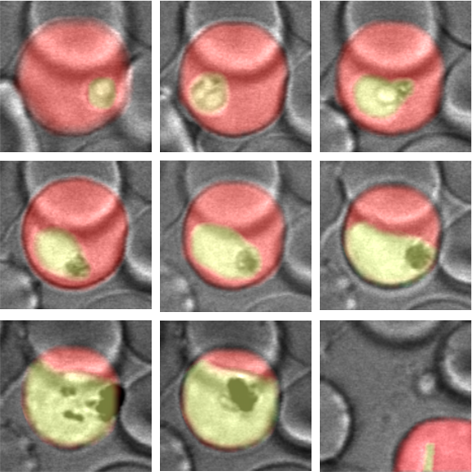BNITM: "We must not let up fighting against this 'forgotten epidemic'!"
World Malaria Day on April 25th
Hamburg, April 25th 2022 - On the occasion of Word Malaria Day, the Bernhard Nocht Institute for Tropical Medicine (BNITM) calls politics and society to step up in the fight against this insidious disease. According to the recent World Malaria Report published by the World Health Organization (WHO), approximately 630,000 people died of malaria in 2020, mainly children in Africa under five.

Following the most recent figures, between 2019 and 2021 an estimated 241 million malaria cases were recorded, 14 million more than the year before. The death toll rose by 69,000. Approximately two thirds of these additional deaths (49,000) can be linked to disruptions in the provision of malaria prevention measures, diagnosis and treatment during the SARS-CoV-2-pandemic. Nevertheless, according to WHO, since the year 2000 23 countries have been declared malaria-free, among them El Salvador and China.
BNITM Chair Prof Jürgen May:
"We have the means to eradicate malaria: We have nets, treatments and other control measures that have proven safe and highly effective, especially against the most deadly variant of the parasite, Plasmodium falciparum. And there are hopes for new effective vaccines. Now, as the coronavirus pandemic recedes, we must once again address this disease scourge that prevents so many countries in the Global South from achieving sustainable development."
Against artemisinin resistance: drug development in Africa
The Bernhard Nocht Institute dedicates a great proportion of its research to malaria, ranging from molecular studies of the malaria parasite and research into its spread and the clinical course of the disease to clinical trials on vaccination and drugs in Africa.
For example, in order to be able to test an antimalarial therapy with a next-generation triple combination, BNITM is conducting a multicenter clinical trial in four African Countries (Ghana, Gabon, Mali and Benin) together with the Kumasi Centre for Collaborative Research (KCCR) in Ghana. The focus lies on the efficacy and safety of an antimalarial treatment. This is vital, especially for children in sub-Saharan Africa.
"In Southeast Asia, the efficacy of proven artemisinin-based combination therapies has already declined significantly due to the emergence of artemisinin-resistant strains," Dr. Oumou Maiga-Ascofaré, project coordinator at KCCR and BNITM, says. "Resistant strains may also spread in Africa and compromise efforts already achieved in reducing the burden caused by Malaria," she adds. She contends that further development of new drug combinations is therefore urgently needed before artemisinin-resistant malaria strains spread widely throughout Africa.

International Day of Action remembers 3 billion people affected
In 2000, the World Health Organization (WHO) established World Malaria Day as an annual international day of action. It reminds us that more than three billion people in the world are at risk from malaria. The WHO and other organizations are striving for a rolling back of this infectious disease, which has come at great financial and logistical expense. This has led to a constant decrease in new cases in recent years.
Please find below a list of our malaria experts, readily available for interview on the occasion of World Malaria Day.
Read more about malaria in the context of COVID-19 and Global Health on our Day of Action website.
BNITM Expert Service on the occasion of World Malaria Day 2022
On the occasion of World Malaria Day, the listed scientists are available for interviews to the press (all requests please also via presse@bnitm.de).
Prof. Dr. Jürgen May / Dr. Oumou Maiga-Ascofaré
Epidemiology, Malaria in Africa, Drug Development
Tel.: 0049-40-285380-261
E-Mail: may(at)bnitm.de
E-Mail: maiga(at)bnitm.de
Prof. Dr. Michael Ramharter
Clinic of Malaria, Treatment, Prophylaxis, Treatment and Vaccination Studies
Tel.: 0049-40-285380-1330, -264
E-Mail: presse(at)bnitm.de
Dr. Tobias Spielmann
Milestones in laboratory research, antibiotic resistance of malaria parasites
Tel.: 0049-40-285380-486
E-Mail: spielmann(at)bnitm.de
We kindly ask you to mention the Bernhard Nocht Institute for Tropical Medicine as the source when mentioning us in texts and interviews as well as when using sound bites in TV and online reports.
The Bernhard Nocht Institute for Tropical Medicine
Bernhard Nocht Institute for Tropical Medicine (BNITM), founded in 1900, is Germany's largest institution for research, treatment and teaching in the field of tropical and emerging infectious diseases and a research centre of the Leibniz Association for Global Infections.
The Institute combines modern laboratory research on the systems, cell and structural biology of pathogens with entomological research on vector animals, immunological and epidemiological research, clinical studies on pathophysiology and drug development, disease control in resource-poor endemic areas, development of new diagnostics and modern education and training.
Current research focuses on malaria, worm infections and other parasitoses as well as diseases caused by arboviruses and haemorrhagic fever viruses. For handling highly pathogenic viruses and infected insects, the institute has laboratories of the highest biological safety level (BSL-4) and a safety insectarium (BSL-3).
For 25 years, BNITM has maintained a research infrastructure on the campus of the University of Kumasi (Ghana). At the Kumasi Centre for Collaborative Research (KCCR), research projects are carried out in collaboration with Ghanaian scientists. In addition, there are numerous collaborations with researchers and scientific institutions in other African countries, in particular Gabon, Nigeria, Tanzania and Madagascar.
The Institute's services include special laboratory diagnostics as well as capacity building and advisory services for science, business, politics and the public. Teaching activities include a tropical medicine course for physicians, student teaching, a PhD training programme and international continuing education programmes. The Institute is a National Reference Centre for Tropical Infectious Agents and WHO Collaborating Centre for Haemorrhagic Viruses and Arboviruses.
The BNITM is a foundation under public law. As a member of the Leibniz Association, it is jointly financed by the Federal Government, the Free and Hanseatic City of Hamburg and the other federal states as a research institute of supraregional importance.


Contact person
Prof. Dr Jürgen May (Chair)
Board of Directors
Phone : +49 40 285380-261
Email : chair@bnitm.de
Prof. Dr Michael Ramharter
Klinische Forschung
Phone : +49 40 285380-511
Email : ramharter@bnitm.de
Dr Tobias Spielmann
Research group leader
Phone : +49 40 285380-486
Email : spielmann@bnitm.de
Julia Rauner
Public Relations
Phone : +49 40 285380-264
Email : presse@bnitm.de






